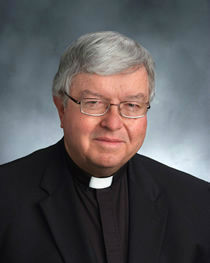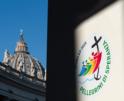
Faith
So the Catholic Church -- rightly and necessarily -- takes positions on a host of public policy issues... Obviously, such advocacy will often intersect with the viewpoint of one or another political party or candidate.

Doyle
Q. My pastor has very liberal political convictions, and he often uses his Sunday homilies to promote the latest liberal agenda. I feel this is an abuse of his pastoral position and I resent his doing this, particularly because my own political beliefs are rather conservative.
Recently, after the pope's message on the modern family, our pastor said this from the pulpit: "All relationships must be honored." He wanted us to honor same-gender marriage despite the fact that the pope had said that it was not acceptable.
After the first Republican presidential debate, he made the following comment in his sermon: "One of the candidates wants to build a wall to keep illegal Mexicans from coming to America. Isn't that a crazy idea?" Other parishioners have also noticed this and are concerned about it. I have seriously considered changing parishes if this continues. (Southern Illinois)
A. The Catholic Church's guidance to its priests is clear: As public representatives of the church, they should neither endorse nor oppose political parties or particular candidates for office. (Not incidentally, this also matches the law of the land as applied to tax-exempt institutions.)
At the same time, as the U.S. bishops said in their 2015 document "Faithful Citizenship": "The church's obligation to participate in shaping the moral character of society is a requirement of our faith." So the Catholic Church -- rightly and necessarily -- takes positions on a host of public policy issues, among which are: care for the poor, the sick and the elderly; protection of human life at every stage; opposition to the death penalty; attention to "just war" principles; and support for a living wage. Obviously, such advocacy will often intersect with the viewpoint of one or another political party or candidate.
On immigration, for example, the position of the Catholic Church is clear. In a 2003 pastoral letter entitled "Strangers No Longer," the U.S. bishops stressed that "when persons cannot find employment in their country of origin to support themselves and their families, they have a right to find work elsewhere in order to survive" and that "more powerful economic nations ... have a stronger obligation to accommodate immigration flows."
In my mind, though -- if you are quoting accurately -- your pastor went beyond what is discreet (or permitted) by relating his views on immigration to a particular candidate. The focus must be always -- and solely -- on the issue itself.
What he said about Pope Francis and same-sex marriage might simply be a matter of emphasis and of how you heard him. In his April 2016 exhortation "Amoris Laetitia," the pope did say that homosexual unions do not match God's plan for marriage and family, but he also said that "every person, regardless of sexual orientation, ought to be respected in his or her dignity and treated with consideration."
Before you decide to change parishes, perhaps you and some like-minded parishioners might seek to meet with your pastor and discuss your concerns. Failing that, if you think that he is clearly violating the church's guidelines, you always have recourse to the chancery office in your diocese.
Q. My children were baptized as Catholics, but none of them is now a practicing Catholic. My middle daughter, through the influence of her husband, has opted to believe that organized religion is more problematic than helpful, and her children do not practice the faith except when I take them to Mass.
Soon I will be traveling with their daughter (my granddaughter) to South America, and I have asked her mother whether I might be able to baptize Sophia before the trip. (I wouldn't do it without her mother's permission.)
If her mother consents, may I do that baptism at home, and are there any special prayers that need to be said except: "I baptize you in the name of the Father and of the Son and of the Holy Spirit?" I love my Catholic faith; I believe that baptism offers a spiritual protection that I want for my granddaughter when we travel together. Please advise. (Jersey City, New Jersey)
A. You acted properly in first asking Sophia's mother for permission to have the girl baptized. The church's Code of Canon Law (in No. 868) provides that, in normal circumstances, the consent of at least one parent is necessary -- danger of death being the exception. Another requirement, however, is the reasonable expectation that the child will be raised as a Catholic.
I'm not sure how old Sophia is right now, but for her to be baptized, some plan should be in place for you or another responsible adult to see to it that she receive the other sacraments of the church, including first penance, first Communion and confirmation -- and, of course, that she be brought to Mass regularly.
As to whether you should administer the sacrament yourself, you should not. Canon No. 861 provides that the ordinary minister of baptism is a bishop, priest or deacon. Yours is not an emergency situation, so you should talk to a local parish to arrange to have Sophia baptized by the parish priest.
- - -
Questions may be sent to Father Kenneth Doyle at askfatherdoyle@gmail.com and 40 Hopewell St. Albany, N.Y. 12208.
- Father Kenneth Doyle is a columnist for Catholic News Service
Recent articles in the Faith & Family section
-
Scripture Reflection for Jan. 12, 2025, Feast of the Baptism of the LordFather Joshua J. Whitfield
-
Ancient wisdom for the modern desert: Bishop Varden on the Desert FathersDr. R. Jared Staudt
-
Holidays of Ordinary TimesLucia A. Silecchia
-
Why is Mary's perpetual virginity so controversial for Protestants?Jenna Marie Cooper
-
The jubilee of jubileesFather Robert M. O’Grady


















